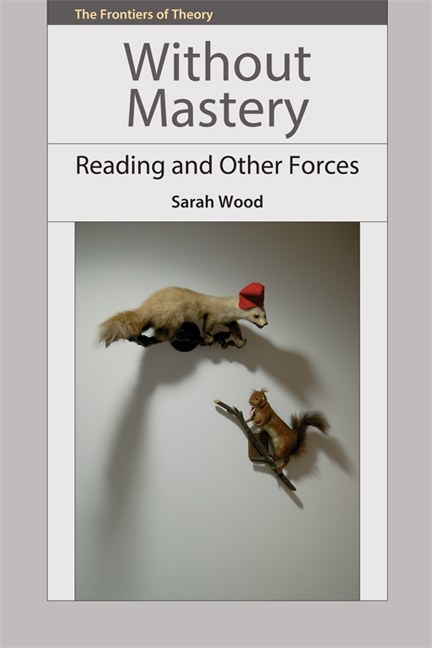Book contents
- Frontmatter
- Contents
- Series Editor's Preface
- Acknowledgements
- Epigraph
- Through the Reader
- Inventing the Reader
- Try Thinking As If Perhaps
- A Mere Instinctive Deconstruction
- Close to the Earth
- Beyond Me Nowhere But This Earth
- Edit
- Reading Matters
- Some Thing, Some One, Some Ghost (About the Fires of Writing)
- Nightshift
- Too Late To Begin?
- Notes
- Index
- Frontmatter
- Contents
- Series Editor's Preface
- Acknowledgements
- Epigraph
- Through the Reader
- Inventing the Reader
- Try Thinking As If Perhaps
- A Mere Instinctive Deconstruction
- Close to the Earth
- Beyond Me Nowhere But This Earth
- Edit
- Reading Matters
- Some Thing, Some One, Some Ghost (About the Fires of Writing)
- Nightshift
- Too Late To Begin?
- Notes
- Index
Summary
It is time to read again: still more naively and passionately. I dedicate this chapter to the anticipated Library Edition of the Complete Works of Jacques Derrida. While you read you might amuse yourself by wondering what that Edition might look like, for whom it might exist and especially by whom it was written.
Would it be, for example, anything like the set of books we call the Standard Edition (of the Complete Psychological Works of Sigmund Freud)? That Standard Edition aspires to uniformity in the translation of key terms and carries in its editorial apparatus signs of a movement, the Psychoanalytical Movement: an institution more or less formal, more or less explicit and more or less exclusive, of colleagues, friends and followers.
If it were to be something like that, the Complete Works of Jacques Derrida would not exclude something else – let's call it ‘the desire for everything + n’ or ‘this catastrophe’ or ‘my chances’ or whatever it is that goes unnamed in Of Grammatology, curled up in a sentence about the ‘recognition’ and ‘respect’ that ‘has always only protected, … never opened a reading’. And it's that something else that I'm concerned with here. In short – in short, I'm on the side of reading. A reading, I would say, is always ‘brief, meagre and laconic’, as dreams are (Freud, The Interpretation of Dreams, p. 279). Reading concerns a certain disappearance. The reader goes off with the text (Cixous, Three Steps on the Ladder of Writing, p. 21). No one gets to see what takes place between them. If that hasn't happened it's just a matter of the reinscription of current social relations within current social relations, of rewording and demonstrating, to others or to oneself that one can indeed ‘speak the language’. Such demonstrations and repetitions may be both unavoidable and desirable but true reading is not held within language (‘Che Cos’è la Poesia?’, p. 235). To edit is to prepare (a writer's work or works for publication) but editing is also what film-makers do: a process of selection, rearrangement, etc., of material filmed previously that includes editing out – removing (a piece of film, tape, etc.) during editing. One edits the better to preserve a memory or two.
- Type
- Chapter
- Information
- Without MasteryReading and Other Forces, pp. 75 - 84Publisher: Edinburgh University PressPrint publication year: 2014



